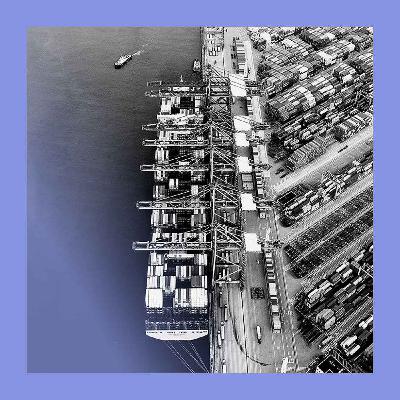Discover Economist Podcasts
Economist Podcasts

Economist Podcasts
Author: The Economist
Subscribed: 282,737Played: 20,528,240Subscribe
Share
Copyright © The Economist Newspaper Limited 2023. All rights reserved.
Description
Every weekday our global network of correspondents makes sense of the stories beneath the headlines. We bring you surprising trends and tales from around the world, current affairs, business and finance — as well as science and technology.
Hosted on Acast. See acast.com/privacy for more information.
1858 Episodes
Reverse
The picturesque town of Corning in upstate New York doesn’t look like the site of bleeding-edge innovation. But inventions by a 174-year-old glass company there have changed the modern world, thanks in part to some blunt advice from Steve Jobs. To listen to the full series, subscribe to Economist Podcasts+. https://subscribenow.economist.com/podcasts-plusIf you’re already a subscriber to The Economist, you have full access to all our shows as part of your subscription. For more information about how to access Economist Podcasts+, please visit our FAQs page or watch our video explaining how to link your account. Hosted on Acast. See acast.com/privacy for more information.
For Season 2, we’re releasing an extended interview alongside each episode. This week: Who needs search engines when chatbots can answer every query for you? That’s the question confronting the head of Search at the world’s most popular website.To listen to the full series, subscribe to Economist Podcasts+. https://subscribenow.economist.com/podcasts-plusIf you’re already a subscriber to The Economist, you have full access to all our shows as part of your subscription. For more information about how to access Economist Podcasts+, please visit our FAQs page or watch our video explaining how to link your account. Hosted on Acast. See acast.com/privacy for more information.
Forget the hammocks and ping-pong tables. Creativity takes work. Managers at Google, Lego and a pair of AI startups share advice on breaking through.To listen to the full series, subscribe to Economist Podcasts+. https://subscribenow.economist.com/podcasts-plusIf you’re already a subscriber to The Economist, you have full access to all our shows as part of your subscription. For more information about how to access Economist Podcasts+, please visit our FAQs page or watch our video explaining how to link your account. Hosted on Acast. See acast.com/privacy for more information.
Good bosses are rare. They don’t have to be. The skills of management can be learned.The Economist’s management columnist, Andrew Palmer, is here to help. The second season of Boss Class features leaders at some of the world’s best performing companies, from Levi’s to Novo Nordisk to Google. New episodes are out weekly starting May 12th. To listen to the full series, subscribe to Economist Podcasts+.https://subscribenow.economist.com/podcasts-plusIf you’re already a subscriber to The Economist, you have full access to all our shows as part of your subscription. For more information about how to access Economist Podcasts+, please visit our FAQs page or watch our video explaining how to link your account. Hosted on Acast. See acast.com/privacy for more information.
The generation born in the 1940s grew up in a land of endless growth and possibility, ruled by a confident, moderate elite. But just as they were embarking on adult life, all that started to come apart. The economy faltered, and the post-war consensus came under pressure from two sides: from the radical right, who hated government moves on civil rights – and from the ‘New Left’, as boomers rebelled against their parents' generation and its war in Vietnam.To listen to the full series, subscribe to Economist Podcasts+. If you’re already a subscriber to The Economist, you have full access to all our shows as part of your subscription. For more information about how to access Economist Podcasts+, please visit our FAQs page or watch our video explaining how to link your account. Hosted on Acast. See acast.com/privacy for more information.
To manage a workforce divided between the home and office, bosses should ask the five basic questions of journalism: who, what, where, when and why. Jamie Dimon, the CEO of JPMorgan Chase, Jane Sun, the CEO of Trip.com Group, and Lidiane Jones, the CEO of Slack, give their divergent views. To hear the full series, subscribe to Economist Podcasts+.https://subscribenow.economist.com/podcasts-plusIf you’re already a subscriber to The Economist, you have full access to all our shows as part of your subscription. For more information about how to access Economist Podcasts+, please visit our FAQs page or watch our video explaining how to link your account. Hosted on Acast. See acast.com/privacy for more information.
Andrew Palmer, The Economist's Bartleby columnist, learns lessons in management on a Norwegian mountainside. He hears from Emma Walmsley, the CEO of GSK; Daniel Kahneman, a Nobel prize-winning psychologist; and Claire Hughes-Johnson, the one-time COO of Stripe. To hear the full series, subscribe to Economist Podcasts+.https://subscribenow.economist.com/podcasts-plusIf you’re already a subscriber to The Economist, you have full access to all our shows as part of your subscription. For more information about how to access Economist Podcasts+, please visit our FAQs page or watch our video explaining how to link your account. Hosted on Acast. See acast.com/privacy for more information.
The workplace keeps changing and managers have to keep up. The best bosses create systems for solving problems old and new—from navigating working-from-home demands to hiring the right people, from running good meetings to managing themselves. Andrew Palmer, author of the Bartleby column, looks for advice on how to be a better boss by talking to people who have actually done the job. Listen to The Economist's seven-episode guide for managers.Boss Class season one is free for a limited time. Season two will appear weekly starting May 12th. To hear new episodes, subscribe to Economist Podcasts+. https://subscribenow.economist.com/podcasts-plusIf you’re already a subscriber to The Economist, you have full access to all our shows as part of your subscription. For more information about how to access Economist Podcasts+, please visit our FAQs page or watch our video explaining how to link your account. Hosted on Acast. See acast.com/privacy for more information.
Jordan Bardella, the leader of the National Rally party, has a stonking lead in voting-intention polls. His plans, our correspondent says, would put France on a collision course with the rest of Europe. We examine a new conservation-finance mechanism being trialled in the Democratic Republic of Congo. And reflecting on the life of Dick Cheney, a remarkably consequential American vice-president.Get a world of insights by subscribing to Economist Podcasts+. For more information about how to access Economist Podcasts+, please visit our FAQs page or watch our video explaining how to link your account. Hosted on Acast. See acast.com/privacy for more information.
Just as soon as President Donald Trump started applying sweeping tariffs on trading partners, legal challenges to them started piling up. We listen in on the Supreme Court proceedings that might end them. America’s gender gap in labour-force participation is growing for the first time; we ask why. And the “dark patterns” that nudge—or trick, or bully—online buyers.Get a world of insights by subscribing to Economist Podcasts+. For more information about how to access Economist Podcasts+, please visit our FAQs page or watch our video explaining how to link your account. Hosted on Acast. See acast.com/privacy for more information.
In the first electoral test of Donald Trump’s second term, Democrat supporters voted in a socialist mayor of New York and governors to New York and Virginia. What does this mean for next year’s midterms? Democracy in Turkey is being eviscerated. And the world may be becoming less grumpy.Listen to what matters most, from global politics and business to science and technology—Subscribe to Economist Podcasts+For more information about how to access Economist Podcasts+, please visit our FAQs page or watch our video explaining how to link your account. Hosted on Acast. See acast.com/privacy for more information.
As America sends its biggest naval hardware to the Caribbean, we ask whether the intent is more than mere sabre-rattling—and why the Trump administration has appetite for another foreign entanglement. Our correspondent sits down with Salman Rushdie to discuss his new book and the value of humour. And as AI-generated spreads, more of the lyrics get filthy. Get a world of insights by subscribing to Economist Podcasts+. For more information about how to access Economist Podcasts+, please visit our FAQs page or watch our video explaining how to link your account. Hosted on Acast. See acast.com/privacy for more information.
The paramilitary Rapid Support Forces have at last taken El Fasher, the capital of Darfur. Reported atrocities are sharply rising, in a chilling echo of what happened in the region two decades ago. Artificial intelligence is narrowing the information asymmetry between sellers and buyers, spelling an end to the “rip-off economy”. And why the literary genre of questionnaires is fading.Get a world of insights by subscribing to Economist Podcasts+. For more information about how to access Economist Podcasts+, please visit our FAQs page or watch our video explaining how to link your account. Hosted on Acast. See acast.com/privacy for more information.
Presidents Donald Trump and Xi Jinping agreed to holster their trade weapons for now. But even if the deal holds, it does not address the deeper problems in the relationship. We examine why mercenaries—and slick international firms that employ them—are doing a roaring trade these days. And a Halloween look at what our correspondent calls a golden age of horror.Get a world of insights by subscribing to Economist Podcasts+. For more information about how to access Economist Podcasts+, please visit our FAQs page or watch our video explaining how to link your account. Hosted on Acast. See acast.com/privacy for more information.
Taxes upon taxes are just one of the reasons that both financial-industry hotshots and businesses are moving out of the Big Apple. We look at what that might cost the city. A snapshot of the drinks business reveals a subtle picture of who is drinking what, and where. And the Chinese rapper that is fast becoming a global household name. Get a world of insights by subscribing to Economist Podcasts+. For more information about how to access Economist Podcasts+, please visit our FAQs page or watch our video explaining how to link your account. Hosted on Acast. See acast.com/privacy for more information.
Europe is edging closer to using seized Russian assets to finance Ukraine. The country badly needs that 140bn-euro windfall—and much, much more. A much-fretted-about AI jobs apocalypse is not here yet, but AI-adopting firms are hiring less for junior-level positions. And our ranking of the passports that permit the most freedom of movement.Get a world of insights by subscribing to Economist Podcasts+. For more information about how to access Economist Podcasts+, please visit our FAQs page or watch our video explaining how to link your account. Hosted on Acast. See acast.com/privacy for more information.
Ships of unknown origin or intent are flummoxing NATO forces on the high seas. Our correspondent visits the Latvian navy on the Virsaitis as it intercepts a mystery vessel. We examine China’s enormous gig economy and how 200m workers are turning precarious conditions to their advantage. And a new book explores what people talk about when they talk about antisemitism.Get a world of insights by subscribing to Economist Podcasts+. For more information about how to access Economist Podcasts+, please visit our FAQs page or watch our video explaining how to link your account. Hosted on Acast. See acast.com/privacy for more information.
Voters overwhelmingly backed the party of President Javier Milei, handing him a lifeline he was not expected to get. We ask how he can finish his vast project of economic change. Meanwhile Germany’s promised package of sweeping reforms is turning out to be lacklustre. And why many video games appear to be getting harder after years of popular-appeal ease.Get a world of insights by subscribing to Economist Podcasts+. For more information about how to access Economist Podcasts+, please visit our FAQs page or watch our video explaining how to link your account. Hosted on Acast. See acast.com/privacy for more information.
This weekend American and Chinese officials are meeting to try and ease tensions over trade after China’s recent decision to restrict rare-earth exports. How has China gained the upper hand? Anxiety about screen time is focused on young people, but the elderly are addicted to devices too. And the wonder of waltzes, from Strauss to “Strictly Come Dancing”.Listen to what matters most, from global politics and business to science and technology—Subscribe to Economist Podcasts+For more information about how to access Economist Podcasts+, please visit our FAQs page or watch our video explaining how to link your account. Hosted on Acast. See acast.com/privacy for more information.
The government shutdown in America is now the second-longest on record. Yet there is no apparent urgency to end it, either from Republicans or Democrats. Why Ghana has escaped the jihadist violence of its neighbours in the Sahel. And bottled water is going upmarket. Listen to what matters most, from global politics and business to science and technology—Subscribe to Economist Podcasts+For more information about how to access Economist Podcasts+, please visit our FAQs page or watch our video explaining how to link your account. Hosted on Acast. See acast.com/privacy for more information.





























It is actually crazy how much impact a country as small as Rwanda has over a country as huge as the DRC. It shows you how unstable and basically ungoverned the DRC really is.
miss information giving to world about Iran by demokratic platforms!
الله اکبر
how many people have israel killed in attack to Iran?
negotiagion with trump was scam for cover the israeil attack to Iran.
how can i find the trascript of each podcast?
what a revelation!!
I as an migrant survived in sweden one year, without any support from sweden government!
Someone should remind those in the government where their forefathers came from when they're bashing Europeans, because in extension they bash themselves, but we all know that a lot of folks up there like to pretend that they're native American or something.
Silver will hit $40.60..
Elvira NabiUlina (the head of Russian Central Bank) not Nabulina
Fertility is not just a factor of choice but also ,well, a question of male fertility. Since the male sperm count has halved in the last 30 years due to the effects of phalates derived from plastics (Dr. Swan et al.) no amount of nudging will restore fertility. Say no more!
Today's The Intelligence "US Policy in Middle East" had some troubling words & undertones... words mean something + lay foundations for other things! Choosing the words "Israel is laying waste to Gaza & Lebanon" there's no reference to why.... such as following October 7th or In its war or even in it's attempt to find and capture terrorists .... NO context, so Israel is BAD or the rest "flirting in escalation with Iran" again lack of context such as 200 ballistic missiles, unprovoked attack
a leftist who supports Putin is not a leftist.
it'd sickening and disgusting to hear the host say in the same breath : the worst massacre in Israeli history and disastrous war in Gaza....madam, it was the worst massacre in gaza too. perpetuated by Israeli war criminals
Love this coverage on Ukraine! The florist interview reminds me this young democracy wants to remain a democracy!
awesome
Boomers are tight because, we've had years added to our pension dates, we've been through many changes to the pension systems, we've seen our money crash too many times and we don't trust the politicians not to screw us over with taxes, or even to move the pension goalposts further and further away. Add to that we expect to live longer and need more care, so what we do have needs to stretch till we're 90
Or a real peace of work?
this is true, that's why I don't have any Chinese app on this phone